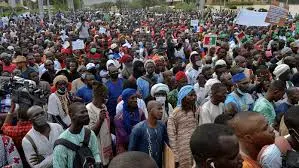A group of Malian parties and civil society organisations has rejected the conclusions of a national dialogue organised by the junta, which recommended several more years of military rule, denouncing the process as a “sham”.
The West African nation has been ruled by the military since back-to-back coups in 2020 and 2021, with junta chief Colonel Assimi Goita launching an inter-Malian dialogue in December in a bid to find a response to the country’s years-long crisis.
The collective of parties and civil groups said they “vigorously denounce the sham of inter-Malian dialogue, initiated by the authorities in power, and reject its recommendations”, in a statement published on social media on Monday and authenticated by AFP.
The military “want to stay in power forever by taking Mali and Malians hostage”, they added.
Mali has since 2012 been plunged into a political and security crisis fuelled by attacks from jihadist and other armed groups, as well as a separatist struggle in the north.
The military, who seized power in 2020, had promised to organise elections and hand over power to civilians by the end of March, but they later postponed elections indefinitely.
On Friday, the conclusions of the national dialogue “recommended” several more years of military rule.

They also said that when elections were eventually held junta chief Colonel Goita should be a candidate for the presidency.
There is little doubt that these conclusions will be implemented.
A major part of the opposition boycotted the dialogue, accusing the army officers of exploiting it to stay in power.
In April, military authorities suspended all party-political activities after muzzling opponents, journalists and human rights activists.
Some of the suspended groups signed the statement rejecting the dialogue’s conclusions.
“Its recommendations in no way reflect the will of the people,” they said, citing the exclusion of all opposition.
“The authorities have demonstrated their notorious inability to provide the slightest hint of a solution,” they added, accusing the junta of ignoring the daily struggle of Malians faced with insecurity, a high cost of living and power cuts.



